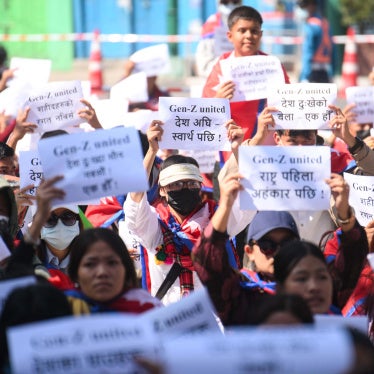Human Rights Watch urges the Commission on Human Rights to adopt a resolution condemning serious and widespread violations of basic human rights in the Democratic People's Republic of Korea (DPRK). The resolution should call on the DPRK to implement recommendations issued by the U.N. Human Rights Committee in July 2001. It should also urge the DPRK to cooperate fully with and provide unrestricted access to United Nations Special Procedures.
Background
The DPRK ratified the International Covenant on Civil and Political Rights in September 1981. Its second periodic report was filed with the U.N. Human Rights Committee in May 2000 after a lengthy delay (it was due in 1987). The DPRK is also a party to the International Covenant on Economic, Social and Cultural Rights.
Human Rights Watch has no access to the DPRK and has not carried out research inside the DPRK. The closed nature of the DPRK and the lack of access by private human rights organizations and U.N. human rights experts is a major obstacle to monitoring abuses and promoting improvements.
Human Rights Watch has conducted research with North Korean refugees who have fled to China, and now reside in Seoul. We collected testimony on horrific conditions and treatment in labor camps and prisons in the DPRK, which we have corroborated with information from other sources. In a report on North Korean refugees published in November 2002, HRW documented serious abuses including: arbitrary and discriminatory treatment of citizens based on family background; torture and cruel and degrading treatment of detainees in labor training camps, provincial concentration centers, and political prison camps known as administrative camps; and the use of forced labor.
Other reports of serious abuses in the DPRK include arbitrary arrests and detention, severe restrictions on basic and fundamental freedoms of belief, assembly, association, religion, press and freedom of movement, and use of the death penalty.
In its submission to the U.N. Human Rights Committee, the DPRK government claimed that torture is prohibited by law, that remedies are in place for those whose civil rights have been violated, that forced labor is "never used as a means of political coercion or of social and religious punishment," and that the DPRK's Criminal Procedures Act strictly limits detentions and arrests. The government also said that it had reduced the number of capital offenses from over thirty to five.
However, the U.N. Human Rights Committee expressed concern that except for murder, the other capital offenses were basically political and vaguely defined so that the death penalty could be utilized to punish peaceful political activities. The Committee made recommendations regarding the use of the death penalty and public executions, torture, trafficking of women, cruel and degrading treatment in prisons, the lack of freedom of movement both within the DPRK and outside the country, the lack of freedom of expression, unfair trials, and the absence of independent human rights organizations in the DPRK.
Refugees
Criminal law in the DPRK prohibits unauthorized departure from the country, in violation of the fundamental right to leave one's country, guaranteed in the Universal Declaration of Human Rights and the International Covenant on Civil and Political Rights. DPRK law provides potentially severe penalties for offenders, from a sentence of three years of labor re-education, to punishment by execution if "one who escapes to another country or to the enemy in betrayal of his motherland" commits a "serious violation."
Regardless of their reasons for leaving, anyone who leaves the DPRK may face imprisonment upon return, especially if they have encountered foreigners, journalists and aid workers. Thus many of those who flee the DPRK are transformed into refugees sur place, or persons who, while abroad, become entitled to protection as refugees because of the risk of political persecution should they return.
The U.N. High Commissioner for Human Rights should have access to all refugees forcibly returned to the DPRK to ascertain that their rights are fully respected and they are not subject to arbitrary detention, ill-treatment and punishment.
Recommendations
- Express grave concern about serious abuses of human rights in the DPRK, and press the DPRK to fully implement the recommendations of the U.N. Human Rights Committee.
- Call on the DPRK government to provide complete and unrestricted access to the U.N. special rapporteurs and working groups on arbitrary detention, torture and ill-treatment, religious freedom, violence against women, and on the independence of judges and lawyers.
- Call on the DPRK government to provide the U.N. High Commissioner for Human Rights access to citizens who have left the country and been forcibly returned in order to determine their safety, treatment and welfare.
The Commission on Human Rights should adopt a resolution that would:






